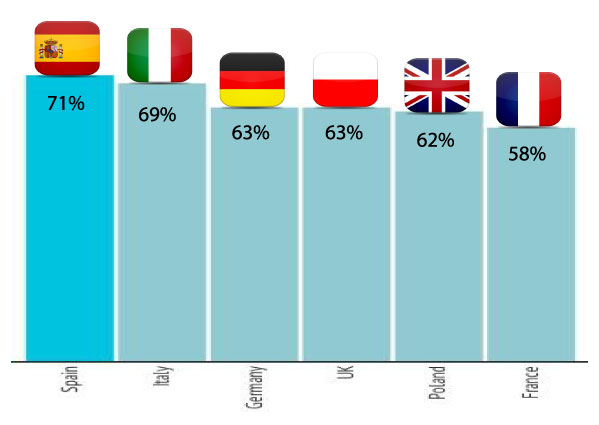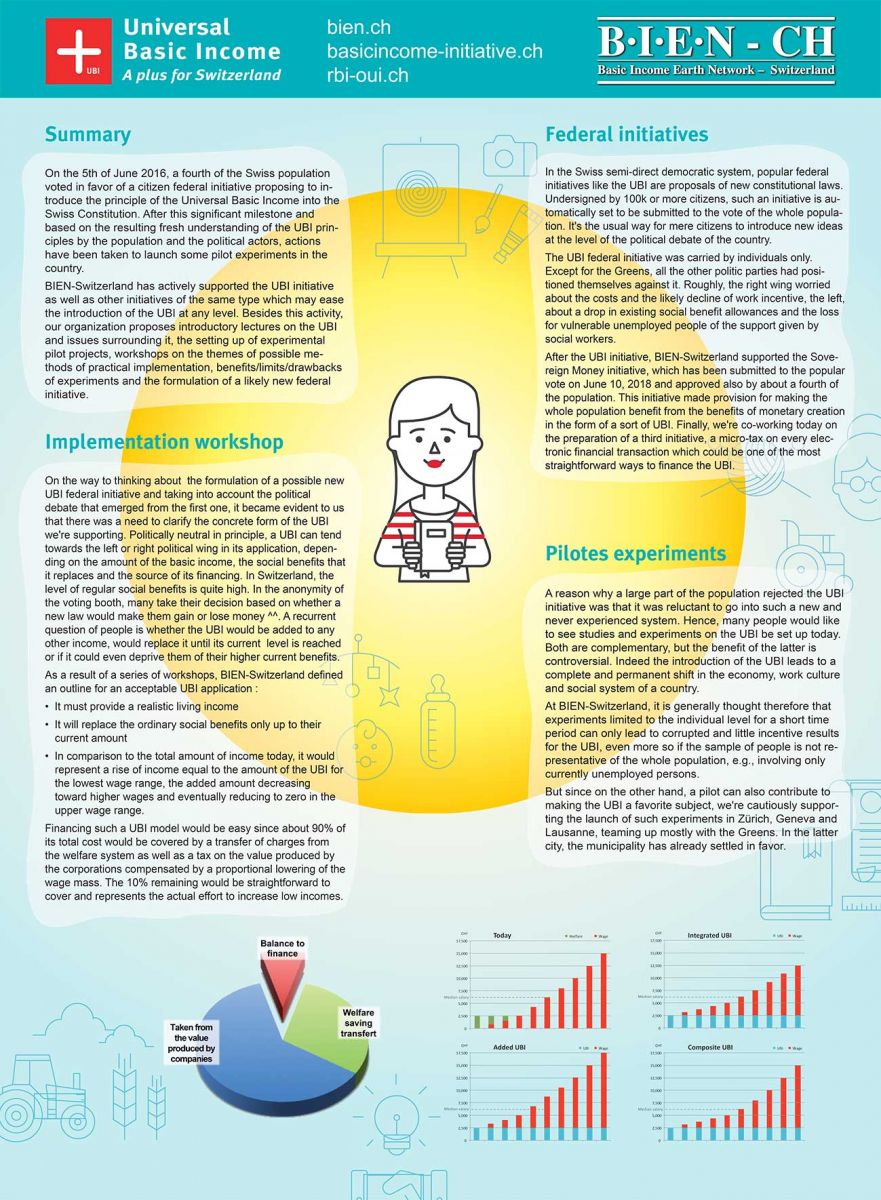Basic Income Earth Network - Switzerland
International
Poster of BIEN-Switzerland for the 18th Congress of BIEN-International
Produced by BIEN-Switzerland, this poster was among those of other affiliated organizations at the 18th Annual BIEN (International) Congress in Tampere, Finland.
Summary
On the 5th of June 2016, a fourth of the Swiss population voted in favor of a citizen federal initiative proposing to introduce the principle of the Universal Basic Income into the Swiss Constitution. After this significant milestone and based on the resulting fresh understanding of the UBI principles by the population and the political actors, actions have been taken to launch some pilot experiments in the country.
BIEN-Switzerland has actively supported the UBI initiative as well as other initiatives of the same type which may ease the introduction of the UBI at any level. Besides this activity, our organization proposes introductory lectures on the UBI and issues surrounding it, the setting up of experimental pilot projects, workshops on the themes of possible methods of practical implementation, benefits/limits/drawbacks of experiments and the formulation of a likely new federal initiative. [+]
- Print node
- Login to post comments
- 12279 reads
Guinness Record - the world's biggest poster

"What would you do if your income were taken care of?" The Unconditional Basic Income raises what might now well be called the world's biggest question. It's been in fact written on a 110x72 meters poster, installed on Plaine de Plainpalais on 14th may in Geneva by the Swiss network for UBI. That day the poster officially won a Guinness Book award of the world's biggest poster. The event got live covered for half an hour on a big screen on New York's Time Square! [+]
- Print node
- Login to post comments
- 13851 reads
UBI poll : 64% of Europeans would vote in favor, 4% would stop working
Most Europeans support the idea of a “basic income” paid to every individual to cover their basic needs, according to the first EU-wide survey on the subject. Governments would pay the same amount of money to each person, regardless of whether they work.
The poll, conducted by German company Dalia Research in April, was the first EU-wide survey to address the proposal of a basic income, defined in the poll as “an income unconditionally paid by the government to every individual regardless of whether they work and irrespective of any other sources of income”.

The preliminary results found that about 58 percent of respondents were aware of the idea of a basic income, and 64 percent would vote in favor of the policy in a referendum. [+]
- Print node
- Login to post comments
- 13054 reads
Travail informel et salaires precaires: Le revenu de base, une solution universelle?

Le revenu de base inconditionnel (RBI) représente-t-il un moyen efficace permettant aux Etats d’atteindre leurs engagements en matière de protection sociale dans le cadre des Objectifs de Développement Durable (Agenda 2030)? Ce séminaire de l’UNRISD va explorer les avantages et inconvénients du revenu de base inconditionnel dans les pays du Nord et du Sud.
Attribution: Icône de Gregor Črešnar
(CC BY 2.0 via The Noun Project)
Le contexte
Le 5 juin, la Suisse organisera la première votation populaire au monde pour inscrire un revenu de base inconditionnel dans sa Constitution. Cette votation, lancée par un groupe de citoyens, au-delà des clivages politiques, fait actuellement l'objet d'un vif débat public en Suisse comme dans certains des pays du Nord et du Sud.
En Suisse, les partisans du projet de loi défendent qu'un RBI permettrait aux gens de vivre une vie digne, satisferait les besoins primaires et garantirait une protection contre les aléas du marché du travail, en particulier du fait des changements technologiques rapides qui rendent certains emplois obsolètes. Il diminuerait en outre la stigmatisation souvent associée à l’assistance sociale et servirait l'égalité des sexes en rétribuant les femmes avec un revenu indépendant, étant donné leur nombre disproportionnellement élevé dans les tâches de soins non rémunérées. Pour leur part, les opposants soutiennent que cette initiative aurait des répercussions négatives sur la protection sociale existante, qu’il est de plus financièrement non viable et pourrait même décourager les gens à travailler tout en entraînant une augmentation de l'immigration. [+]
- Print node
- 21503 reads
Robert Reich: It will not work without the Basic Income
Why the US economist and former Labor Secretary Robert Reich is in favor of the Swiss initiative and what that has to do with robots.?

dvancement opportunities have been halved – Robert Reich (16 january 2014).
Interview with Robert Reich by Michael Soukup
You are a prominent advocate of basic income, on which Switzerland votes in June. Why?
Sooner or later we cannot do without Basic Income, we just won’t have another choice. The technological progress kills more and more jobs. The British economist John Maynard Keynes said in 1928, in 2028 nobody has to work anymore to ensure his living thanks to the technical progress.
Are we not working more than ever? [+]
- Print node
- Login to post comments
- 31388 reads




